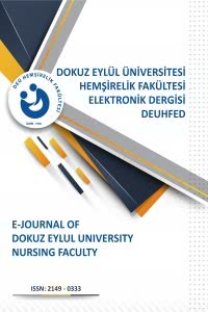Sekizinci Sınıf Öğrencilerine Bilişsel Davranışçı Yaklaşıma Göre Uygulanan Öfke Kontrol Programının Etkinliği
Öfke Kontrol Programı, Bilişsel Davranışçı Yaklaşım, Ergen, Öfke, Hemşire
Anger Control Program’s Effectiveness Applied to Eighth Grade Students According to Cognitive-Behavioural Approach
Anger Control Program, Cognitive Behavioral Therapy, Teenager, Anger, Nurse.,
___
- Chin, L. S., & Ahmad, N. S. (2014). Effect of anger management module using cognitive behavioral therapy (CBT) on anger expression among the adolescents in secondary school. Journal Psikologi Malaysia, 27, 25-39.
- Cole, R. L., Treadwell, S., Dosani, S., & Frederickson, N. (2013). Evaluation of a short-term, cognitive-behavioral intervention for primary age children with anger-related difficulties. School Psychology International Journal, 34 (1), 82-100.
- Currie, M., & Startup, M. (2012). Doing anger differently: Two controlled trials of percussion group psychotherapy for adolescent reactive aggression. Journal of Adolescence, 35, 843-853.
- Çivilidağ, A. & Cooper, T. H. (2013). Ergenlerde siber zorba ve öfkenin incelenmesi üzerine bir araştırma: Niğde ili örneği. International Journal of Social Science, 6 (1), 497-511.
- Deffenbacher, J. L. (2008). Anger, aggression, and risky behavior on the road: A preliminary study of urban and rural differences. Journal of Applied Social Psychology, 38 (1), 22-36.
- Duran, Ö., & Eldeleklioğlu, J. (2005). Öfke kontrol programının 15 ve 18 yaş arası ergenler üzerindeki etkililiğinin araştırılması. Gazi Üniversitesi Eğitim Fakültesi Dergisi, 25 (3), 267-280.
- Edmonson, B. C. & Conger, J. C. (1996). A review of treatment efficacy for individuals with anger problems: Conceptual, assessment and methodological issues. Clinical Psychology Review, 16 (3), 251-275.
- Fossum, S., Handegård, B. H., Adolfsen, F., Vis, S. A., & Wynn, R. (2016). A meta-analysis of long-term outpatient treatment effects for children and adolescents with conduct problems. Journal of Child and Family Studies, 25 (1), 15-29.
- Galitz, T., & Robert, D. (2014). Governing bullying through the new public health model: Foucaultian analysis of a school anti-bullying programme. Critical Public Health Journal, 24 (2), 195-182.
- Görgü, N., & Sütçü Tekinsav, S. (2015). İşlevsel olmayan öfkenin tedavisinde bilişsel davranışçı grup terapisi etkililiği: Sistematik bir gözden geçirme. Psikiyatride Güncel Yaklaşımlar, 8 (1), 129-143.
- Hahn, R., Fuqua-Whitley, D., Wethington, H., Lowy, J., Crosby, A., Fullilove, M., et.al. (2007). Effectiveness of universal school-based programs to prevent violent and aggressive behavior: A systematic review. American Journal of Preventive Medicine, 33 (2), 114-129.
- Henwood, K. S., Chou, S., & Browne, K. D. (2015). A systematic review and meta-analysis on the effectiveness of CBT informed anger management. Aggression and Violent Behavior Journal, 25, 280-292.
- Kelleci, M., Avcı, D., Erşan, E., & Doğan, D. (2014). Bilişsel davranışçı tekniklere dayalı öfke yönetimi programının lise öğrencilerinin öfke ve atılganlık düzeylerine etkisi. Anatolian Journal of Psychiatry, 15, 296-303.
- King, K. K. (2014). Violence in the school setting: A school nurse perspective. The Online Journal of Issues in Nursing, 19, 1, 4.
- Lochman, J. E., Palardy, N. R., McElroy, H. K., Phillips, N., & Holmes, K. J. (2004). Anger management interventions. Journal of Early and Intensive Behavior Intervention, 1 (1), 47.
- Lochman, J. E., Power, N. R., Clanton, N., & McElroy, H. K. (2006). Anger and aggression National Association of School Psychologists, 115-127.
- Mackay, C. H., Barkham, M., & Styles, W. (1998). An anger event in psychodynamic-interpersonal therapy. Journal of Counseling Psychology, 45 (3), 279-289.
- Öz, F. S., & Aysan F. (2008). Öfke yönetimi eğitiminin ergenlerde öfke ile başa çıkma ve iletişim becerilerine etkisi. International Online Journal of Educational Sciences, 1 (3), 343-369.
- Özer, K. (1994). Sürekli öfke ve öfke ifade tarzı ölçekleri ön çalışması. Türk Psikoloji Dergisi, 9 (31), 26-35.
- Sağlık Bakanlığı. (2010, Mart). Hemşirelik yönetmeliği (No. 27515). Türkiye.
- Sağlık Bakanlığı (2015, Şubat) Toplum sağlığı merkezi ve bağlı birimler yönetmeliği (No. 292585). Türkiye.
- Savaşır, I., & Şahin, N. H. (1997). Bilişsel davranışçı terapilerde değerlendirme: sık kullanılan ölçekler. (ss.9.). Ankara: Psikologlar Derneği Yayınları.
- Sezen, B., & Bedel, A. (2016). Müzakere ve arabuluculuk eğitiminin ergenlerin kişiler arası problem çözme yaklaşımlarına ve öfkelerine etkisinin incelenmesi. Eğitim ve Bilim Dergisi, 40 (182), 63-75.
- Spielberger, C. D., Jacobs, G., Russell, S., & Crane, R. S. (1983). Assessment of anger: The state-trait anger scale. Advances in Personality Assessment, 2, 159-187.
- Sukhodolsky, D. G., Kassinove, H. V., & Gorman, B. C. (2004). Cognitive behavioural therapy for anger in children and adolescents: A meta analysis. Aggression and Violent Behaviours Journal, 9, 247-269.
- The Leap Series. (2011). Anger: Managing the volcano within (1rd ed., pp.4-12). India: Leadstart.
- Tosun, U. (2014). Anger management of students for a peaceful school environment: the group studies. Procedia-Social and Behavioral Sciences, 159, 686-690.
- Türk, F., Hamamcı, Z. (2016). Bilişsel-Davranışçı Yaklaşım’a dayalı olarak uygulanan öfke kontrolü programlarının etkililiğinin değerlendirilmesi: Bir meta-analiz çalışması. Uluslararası Sosyal Araştırmalar Dergisi, 9, 43, 1522-1528.
- Türkiye Büyük Milet Meclisi Araştırma Komisyonu. (2007). Türkiye’de ortaöğretime devam eden öğrencilerde ve ceza ve infaz kurumlarında bulunan tutuklu ve hükümlü çocuklarda şiddet ve bunu etkileyen etkenlerin saptanması. Araştırma Raporu, Ankara, 56-58.
- World Health Organization. (2014). Global status report on violence prevention. Retrived November 13, 2014 from http://www.who.int/violenceprevention/publications
- ISSN: 2149-0333
- Yayın Aralığı: 4
- Başlangıç: 2008
- Yayıncı: Dokuz Eylül Üniversitesi Hemşirelik Fakültesi
Hemşirelik Öğrencilerinin Egzersiz Davranışları ve Uyku Kaliteleri
SULTAN AYAZ ALKAYA, Canan BİRİMOĞLU OKUYAN
Özlem KÜÇÜKGÜÇLÜ, Burcu Akpınar SÖYLEMEZ
Kronik Obstürüktif Akciğer Hastalarının Alternatif ve Tamamlayıcı Tedavi Yöntemi Kullanımı
Cemile Kütmeç YILMAZ, Güler Duru AŞİRET, Funda ÇETİNKAYA, Sevgisun KAPUCU
Doğum Korkusu Ölçeği’nin Geçerlilik ve Güvenilirliği
PINAR SERÇEKUŞ AK, GÖZDE GÖKÇE İSBİR, FADİME HATİCE İNCİ
Kronik Obstrüktif Akciğer Hastalarının Tamamlayıcı ve Alternatif Tedavi Yöntemi Kullanımı
CEMİLE KÜTMEÇ YILMAZ, GÜLER DURU AŞİRET, FUNDA ÇETİNKAYA, SEVGİSUN KAPUCU
Acil Servis Hemşirelerinin Etik Duyarlılıklarının İncelenmesi
Betül FIRAT, Gülebru KARATAŞ, Atike BARUT, Gökhan METİN, DİLEK SARI
Hekim ve Hemşirelerin Bazı Özelliklerinin Saygın Ölüm İlkelerine İlişkin Tutumlar Üzerine Etkisi
